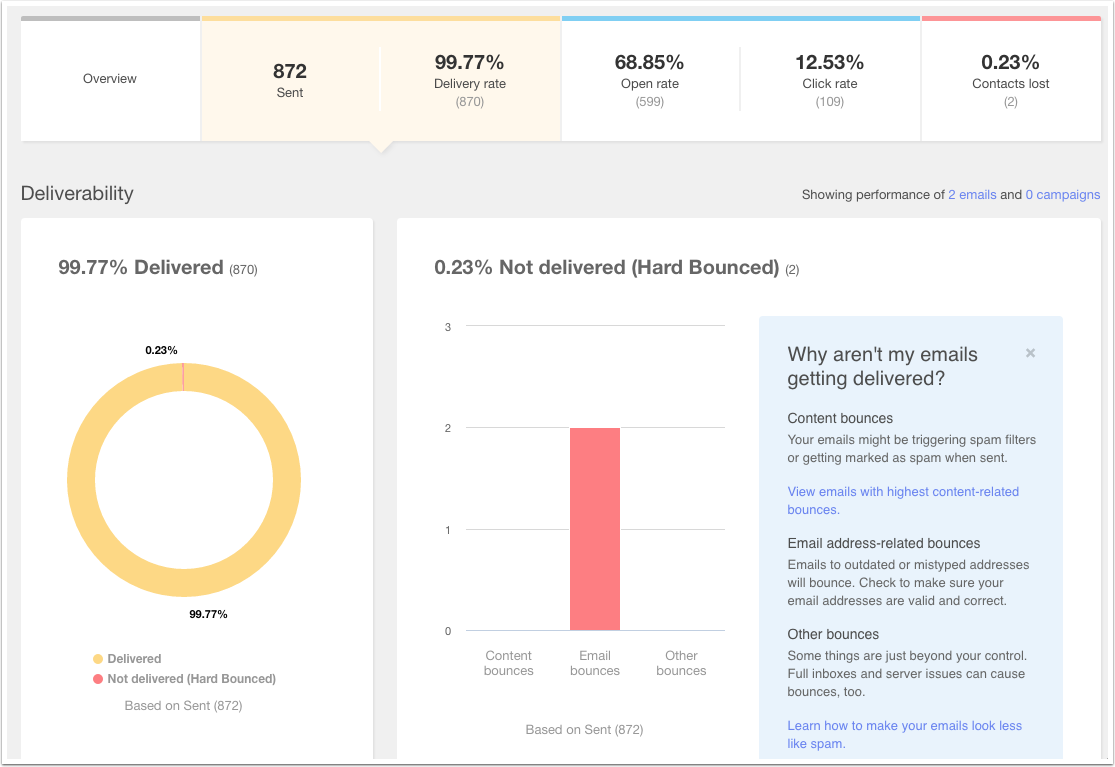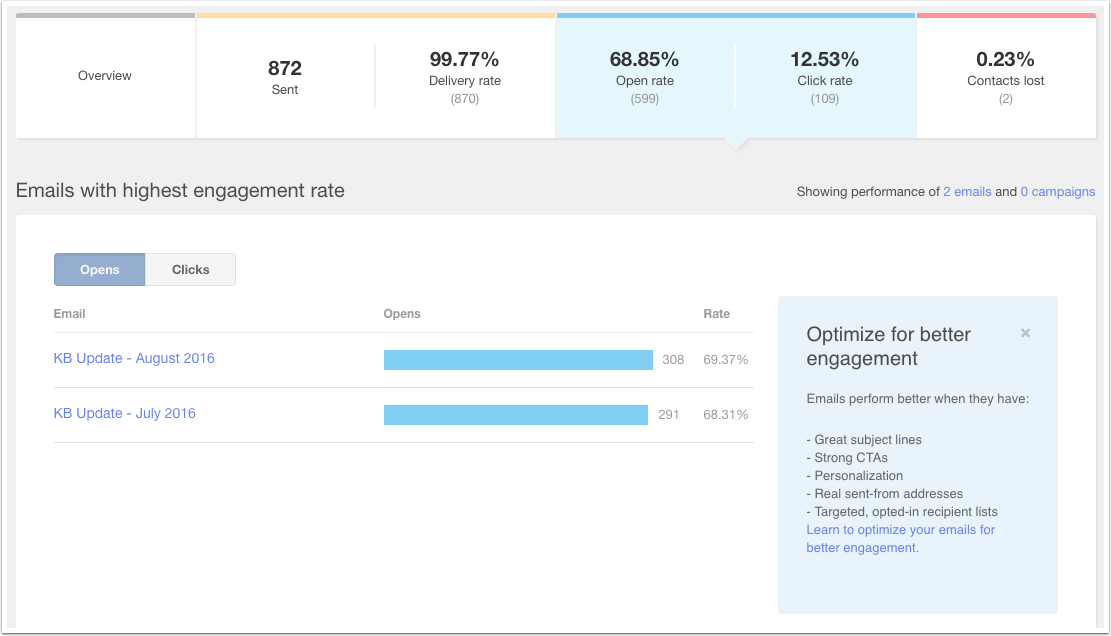So, in Part 1 of “Growing Your Email Marketing List the Right Way,” we introduced the subject of email marketing lists and addressed a number of strategies that can be used to grow these lists. (You can find Part 1 here in case you missed it). However, due to the extensive nature of the strategies, we couldn’t cover all the strategies we had in mind. Kindly find the remaining strategies addressed here, along with a conclusion on the topic.
Create Value-adding Content
Develop value-adding content in your emails using the following email marketing tips:
Awesome Subject Lines
Like the first email you send after a sign-up, your subject lines should be punchy and attention-grabbing to encourage the users to open and read the email. Most studies conducted regarding subject lines report that a majority of readers love short subject lines, meaning you should avoid getting too wordy with yours.
Straight to the Point Content
Avoid going in circles with your email or including too much fluff on the emails, as this will bore the hell out of your readers. If you have something to say, go straight to the point and keep it as short as possible while balancing your use of images and texts in the email.
Aesthetic Appeal
Yes, readers will judge your email (and may even decide to opt out of your list) if whatever you send to them isn’t appealing to the eyes. As such, you should steer away from plain emails—instead opting for well-designed and responsive emails that can suit all manner of email-accessing devices.
Personalization of Content
Using individual details such as past purchasing behaviors, purchase-based demographics (i.e. age and race) and location of the subscribers; you can easily segment your email list to ensure that your messages give your members the best personalized experiences. You’ll keep your subscribers glued to your emails while attracting many others who are seeking an organization that can offer such personalized experiences.
Use Brand Ambassadors alongside Valuable Content
A-list celebrities, prominent sports personalities, thought-provoking industry leaders, and other respected opinion leaders in the society can push your brand to higher levels if you involve them in email marketing as your brand ambassadors. By talking about joining your list or offering testimonials about the benefits of being members of your email list, the general public will feel like being part of your brand is cool, motivating them to join the list as well. Nike, Apple, Disney and Microsoft are some examples of top companies that have actively embraced the use of celebrities as marketing brand ambassadors.
Tap into the Value of Preference Centers
Preference centers allow members of your email marketing list to customize the mailing services to their preferences, which in turn reduces the chances of them unsubscribing, complaining, or even marking your emails as spam.
A good example of how a preference center can save you lots of trouble is by allowing members to decide how frequently they want to receive emails, or what type of content they want to receive from you under the “manage your preferences” section. By giving them this control, the users are more likely to respond positively to your email marketing campaigns.
Additionally, your email preference centers can include tools like QAs that ask your members about their product/service preferences and interests. Once you have such information, you can tailor your email deliveries to address these needs in a personalized way, which would—in turn—encourage more engagement with your audience.

Emphasize Focus on Email Deliverability
It doesn’t matter how catchy, informative or well-designed your email marketing campaigns are if they won’t be delivered to your subscribers’ inboxes. 21% of email routinely goes undelivered, according to ReturnPath’s 2016 Deliverability Benchmark Report, and this greatly reduced the purpose of the email marketing campaign. Keeping this in mind; your top priority when sending any email to members of your list should be ensuring that the messages get delivered to your customers’ inboxes. Below are some of the email deliverability tips you can use to encourage success in this process:
Monitor and Evaluate Your Email Engagement Metrics
A majority of today’s email marketing templates and programs have provisions for monitoring your engagement with your customers, using data on clicks, opens, shares, likes etc. Monitoring this engagement not only provides useful information about your top email marketing campaigns, but it also helps you learn about what your customers like/hate most, thus allowing you to target the campaigns and email deliverables accordingly.
Below is an example of how you can monitor the delivery of your emails using Hubspot’s Sent/Delivery Rate tab:

In the example that follows below, a highlight is given of how the Hubspot email tool can help you to monitor the Open and Click rates of your emails:

Cleaning Your Email List
Inactive addresses, unknown users and emails that generally end up with hard bounces can be very misleading to your company, giving you false numbers about how big your audience is or how many emails get delivered to customers’ inboxes. To ensure deliverability and avoid sending messages to ghost subscribers, be sure to clean your email marketing list, getting rid of such “stale” and inactive subscribers periodically (like in every three or six months, depending on how big your email list is).
Pay special attention to High-Value Customers
It goes without saying that every single member of your mailing list is important. Even so, there certain members whose value is bound to stand out, either because they are more engaged in your campaigns, or they make more purchases. When you identify these high-value customers, it is important that your communications and offers are customized such that your messages are delivered in a timely and personalized manner to them.
Avoid Inorganic Mailing lists
As mentioned earlier, the buying, borrowing, renting and sharing of mailing lists will more often than not lead to poor engagement rates with your audience, with most of the people in such lists often opting to spam your mails thus no delivery. If you’re looking for good email deliverability, stick to organic subscriptions—those customers that willingly opted into your email list.
Test Your Email Campaigns Before Sending
Once you have all the above-mentioned best-practice strategies in check, make a point of testing your email marketing campaigns on a small scale, either within your office or even by sending it to a small group of subscribers (and requesting for their feedback regarding these emails). By sending these emails and getting feedback about them, you are sure to learn about things that are working and those that need to be changed before being sent on a large scale.

FINAL REMARKS
Building a quality, user-engaged email marketing list is a process that takes time and involves quite a number of resources. That said, taking the time to build your emailing list the right way will help you avoid many obstacles (like quick unsubscriptions and spamming of your emails), most of which are often faced by companies that use inorganic email lists. Opting into your email marketing program gives control to the subscriber, and the availability of tools such as the preference center gives them more freedom to customize their needs and interests. In turn, this encourages better email engagement with the customers, leading to desired conversions for your company and satisfied (and returning) customers.
GMass is the only tool for marketing emails, cold emails, and mail merge — all inside Gmail. Tons of power but easy to learn and use.
TRY GMASS FOR FREE
Download Chrome extension - 30 second install!
No credit card required










